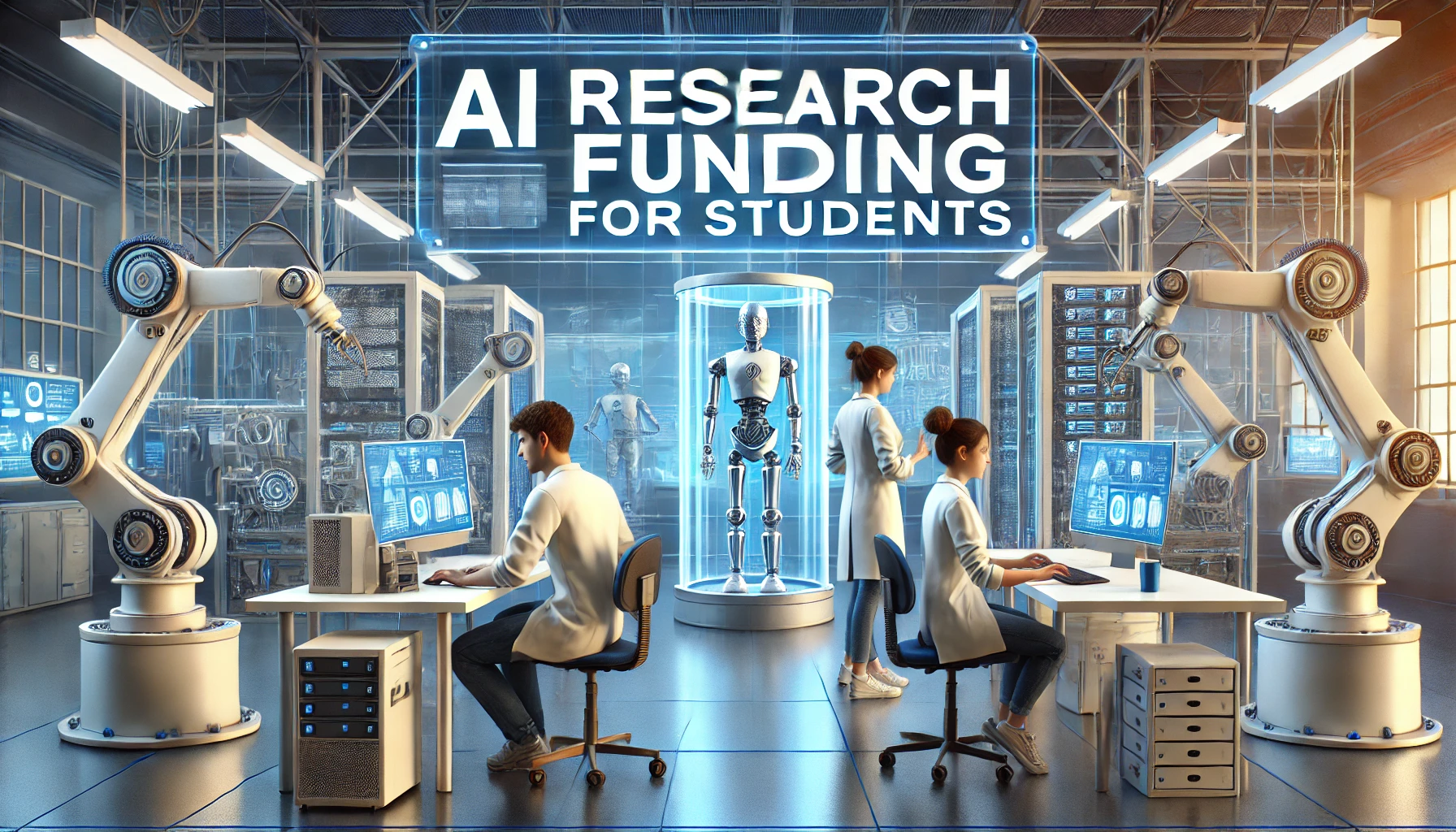Artificial Intelligence (AI) is one of the fastest-growing fields in the world today. It is changing industries like healthcare, transportation, education, and more. Many students want to study AI, but conducting research or earning a degree in this field can be expensive. Fortunately, AI Research Funding for Students are several funding opportunities available to help students who are passionate about AI achieve their goals.
This article will explore AI research funding for students, including grants, scholarships, and fellowships that support their academic and project needs. We will also cover how to apply, what each program offers, and include helpful links for further information.
Why AI Research Funding for Students Matters
AI is shaping the future of our world. From self-driving cars to chatbots and medical diagnostics, AI is improving the way we live and work. However, developing AI technologies requires skilled professionals and significant research. That’s where students come in—young innovators who can contribute fresh ideas and develop cutting-edge solutions.
But pursuing AI research often requires expensive tools like high-performance computers, software licenses, and access to large datasets. Funding programs ensure that financial barriers don’t stop talented students from exploring this exciting field.
Offers and Costs Covered by AI Research Funding for Students
Here are some popular funding programs for students pursuing AI research:
1. Google AI Residency Program
- Award Amount: Full tuition coverage and a stipend for living expenses.
- Eligibility: Open to students who have completed a bachelor’s or master’s degree in computer science or a related field.
- Covers: Research mentorship, access to Google’s advanced AI tools, and training in machine learning (ML) and deep learning (DL).
- Application Process: Students must submit a resume, research proposal, and letters of recommendation.
- Learn More: Google AI Residency Program
2. Amazon Web Services (AWS) AI Research Grants
- Award Amount: Up to $100,000 in AWS credits for cloud computing resources.
- Eligibility: Open to undergraduate and graduate students conducting AI research in universities.
- Covers: Cloud computing services for training AI models, storage, and data processing.
- Application Process: Requires a research proposal detailing how AWS resources will be used.
- Learn More: AWS Research Grants
3. OpenAI Research Internships
- Award Amount: Competitive salaries and funding for relocation.
- Eligibility: Students or recent graduates with experience in coding and machine learning.
- Covers: Research projects in natural language processing (NLP), robotics, and reinforcement learning.
- Application Process: Requires a coding challenge and a research proposal.
- Learn More: OpenAI Careers
4. Facebook (Meta) Ph.D. Fellowship in AI
- Award Amount: $42,000 annual stipend plus tuition fees.
- Eligibility: Ph.D. students conducting research in AI, computer vision, or computational social science.
- Covers: Tuition, living expenses, and travel for conferences.
- Application Process: Students need a letter of recommendation, a research summary, and a curriculum vitae (CV).
- Learn More: Meta Ph.D. Fellowship
5. Microsoft AI for Earth Grant
- Award Amount: $5,000–$15,000 worth of Azure credits and funding for AI research projects addressing environmental challenges.
- Eligibility: Open to students working on AI projects related to climate change, water conservation, or biodiversity.
- Covers: Access to cloud computing tools and funding for field research.
- Application Process: Submit a proposal outlining the environmental impact of your AI project.
- Learn More: Microsoft AI for Earth
6. National Science Foundation (NSF) Graduate Research Fellowship Program (GRFP)
- Award Amount: $34,000 annual stipend plus $12,000 for tuition and fees.
- Eligibility: U.S.-based graduate students in AI, data science, or computer science.
- Covers: Tuition, research equipment, and living expenses.
- Application Process: Requires academic transcripts, research proposals, and recommendation letters.
- Learn More: NSF GRFP
7. MIT-IBM Watson AI Lab Grants
- Award Amount: Varies by project but can exceed $50,000.
- Eligibility: Open to undergraduate and graduate students collaborating with faculty on AI research.
- Covers: Tuition, lab fees, and AI development tools.
- Application Process: Submit a joint application with your faculty advisor.
- Learn More: MIT-IBM Watson AI Lab
How to Apply for AI Research Funding for Students
Applying for funding requires careful planning. Follow these steps to improve your chances:
- Identify the Right Program
Use resources like Scholarship Positions and Grants.gov to find programs that match your interests and research goals. - Prepare Your Documents
Common requirements include:
- Academic transcripts
- Letters of recommendation
- Research proposals
- Personal statements
- Demonstrate Innovation
Your research should address real-world problems or propose unique solutions. Include details on how your work will contribute to the field. - Follow Deadlines
Funding applications are time-sensitive. Set reminders for deadlines and ensure all required materials are submitted on time. - Seek Guidance
Talk to professors or advisors for feedback on your proposal. Their input can strengthen your application.
Key Topics for AI Research Funding for Students
- AI research funding opportunities
- Machine learning grants for students
- Deep learning scholarships 2024
- Artificial intelligence grants for students
- How to fund AI research projects
- Top AI scholarships for college students
- AI education funding programs
- Best funding for AI innovation
- High-paying AI research grants
- STEM funding for AI students
Success Stories of AI Research Funding for Students
Maria Torres – Natural Language Processing Expert
Maria, a graduate student at Stanford University, received the Facebook Ph.D. Fellowship for her work on multilingual AI models. Her research now powers translation tools used by millions.
Ahmed Yusuf – Climate AI Innovator
Ahmed utilized the Microsoft AI for Earth Grant to develop AI models predicting drought conditions in sub-Saharan Africa. His project has helped farmers plan their crops more effectively.
Priya Sharma – Robotics Researcher
Priya’s Google AI Residency allowed her to develop robotic systems for disaster response. She is now a lead researcher at one of the world’s top AI labs.
Helpful Links for Further Reading
- Top AI Research Programs in 2024
- Grants for Students in STEM Fields
- How to Apply for Scholarships in Technology
- OpenAI: Careers in AI Research
- Microsoft AI Initiatives
Frequently Asked Questions (FAQs) About AI Research Funding
Here are some common questions students ask about AI research funding:
1. Can international students apply for AI research grants?
Yes, many AI research grants, such as the Google AI Residency Program and AWS AI Research Grants, are open to international students. However, some programs like the NSF Graduate Research Fellowship are limited to U.S. citizens or permanent residents. Always check the eligibility criteria for each funding opportunity.
2. Do I need prior research experience to apply for these grants?
Not all grants require prior research experience. Programs like the Google AI Residency are designed to train students and give them hands-on experience. However, having basic knowledge of AI and machine learning will strengthen your application.
3. Are high-performance computers necessary for AI research?
Yes, AI research often involves training complex models, which requires high-performance computing resources. Many grants, such as the AWS AI Research Grants and Microsoft AI for Earth, provide cloud credits to access such resources.
4. What should I include in my research proposal?
A strong research proposal should include:
- A clear research objective.
- Background information and literature review.
- Methodology explaining how you’ll achieve your goals.
- Expected outcomes and their potential impact.
5. How competitive are these grants?
AI research funding is highly competitive due to the field’s growing importance. Strengthen your application by showcasing innovation, academic achievements, and how your research addresses real-world challenges.
Challenges Faced by Students Pursuing AI Research

While funding opportunities make AI research more accessible, students still face challenges, including:
1. Access to Large Datasets
AI projects often require massive datasets for training models. Many datasets are restricted or expensive, making it hard for students to access them. However, platforms like Kaggle and OpenAI Datasets offer free datasets to support research.
2. Keeping Up with Technology
AI evolves rapidly, and staying updated on the latest tools, algorithms, and frameworks can be overwhelming. Attending workshops and online courses like those on Coursera and edX can help.
3. Balancing Academic and Research Work
Balancing coursework, research, and grant applications can be challenging. Time management skills and setting clear priorities are essential.
Ways to Maximize Funding Opportunities
To make the most of your funding opportunities, follow these tips:
1. Collaborate with Professors
Professors often have connections with funding organizations or ongoing research projects. Collaborating with them can open doors to grants and mentorship.
2. Network at Conferences
AI conferences like NeurIPS and ICLR are excellent opportunities to meet researchers, funders, and industry leaders. Presenting your work at such events can boost your visibility.
3. Leverage Free Online Resources
Many platforms offer free access to AI tools and tutorials. For instance, Google Colab provides free GPU resources for training models.
4. Apply Early and Often
Don’t wait for deadlines to approach. Start your applications early, and apply to multiple programs to increase your chances of success in AI Research Funding for Students.
READ MORE OPPORTUNITIES: Best Free Online Biology Courses for High School Students
Emerging Trends in AI Research
The field of AI is continuously evolving. Here are some trends that are gaining traction and could inspire your next research project:
1. Ethical AI
As AI systems become more powerful, ethical concerns like bias and fairness are becoming critical. Research on creating unbiased algorithms is in high demand.
2. AI for Social Good
AI is being used to tackle global challenges such as poverty, education inequality, and disaster response. Projects in this area are often eligible for funding from organizations like AI for Good.
3. Edge AI
Unlike traditional AI models that rely on cloud computing, edge AI processes data locally on devices, making it faster and more secure.
4. AI in Education
Developing AI tools for personalized learning and automated assessments is a growing area of interest.
5. Human-AI Collaboration
Researching ways humans and AI can work together effectively, such as AI-assisted design and decision-making systems, is gaining importance.
Benefits of AI Research Funding for Students
AI research funding not only supports your education but also provides:
1. Financial Freedom
Grants and scholarships reduce the financial burden of tuition, equipment, and research costs, allowing you to focus on your studies.
2. Access to Resources
Funding programs often include access to exclusive tools, datasets, and mentorship from experts in the field.
3. Career Opportunities
Being a recipient of prestigious funding opens doors to internships, job offers, and collaborations with top tech companies.
4. Global Recognition
Publishing funded research in journals or presenting it at conferences can establish you as a leader in AI research.
Let me know if you would like additional sections, such as expanding on emerging trends or success stories!
Conclusion on AI Research Funding for Students
AI research funding is an incredible opportunity for students passionate about shaping the future of technology. Whether you’re working on cutting-edge AI applications, studying ethical AI, or exploring its use in fields like education and environmental conservation, there are many grants and scholarships designed to support your journey.
Programs like the Google AI Residency, Microsoft AI for Earth, and Meta Ph.D. Fellowship not only provide financial aid but also offer mentorship, access to advanced tools, and opportunities to work on impactful projects. By applying early, preparing strong research proposals, and exploring multiple funding opportunities, you can significantly increase your chances of success.
AI is driving global innovation, and students like you are at the forefront of this exciting field. With the right funding, resources, and determination, you can make groundbreaking contributions to AI research and help solve some of the world’s most pressing challenges.
Start your journey today by exploring these resources:
Your future in AI innovation awaits—take the first step and apply for funding now!

